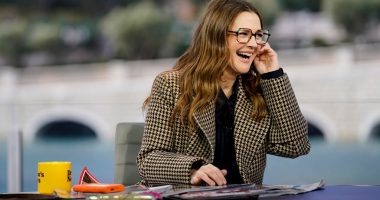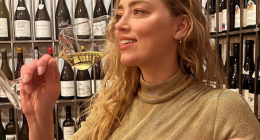
Jamie Lee Curtis teased her final chapter in the Halloween franchise while celebrating her more than four decades of portraying Laurie Strode during a special Saturday tribute panel.
Scream star and daytime TV host Drew Barrymore hosted the hour-long retrospective which touched on Curtis’ early years in one of her first major film roles through her return in H20 and her last three films with director David Gordon Green.
The panel kicked off with crowd chants for Curtis, who almost immediately became emotional when asked about how she felt about her run with Halloween coming to an end. “You know endings are a bitch, but so is Laurie Strode,” she said before beginning to choke up. “So, I’m ready to end it, but I’m gonna miss you so much.”
“Everything good in my life came from that shitty little office on Cahuenga Boulevard in Hollywood — that was about the size of where these two chairs are — when John Carpenter and Debra Hill cast me in the part [of] Laurie Strode. I didn’t know it then, [but]I know it now: one of these days, hopefully not tomorrow, but I’m 64 — I mean, do the math, it’s not in my favor — sooner than later it’s gonna say three words: Halloween actress dies,” Curtis added later. “My point is, it is the permanent ink of my life. Whatever I do, forever, Laurie Strode is because of you.”
Beyond sharing her love for the fans of the franchise and a character who, she says — with the encouragement of Carpenter — taught her the importance of vulnerability, Curtis discussed her decision to come back for H20 (and why she was only in about 10 minutes of Halloween: Resurrection); what has made Laurie such an enduring character (and a challenge in Curtis’ early career); as well as what Halloween Ends has in store and what director David Gordon Green has added to the franchise with its last three installments.
When it comes to the final chapter, Curtis pointed to hope as being a significant part of the film’s message, noting that “if we don’t have hope, we’re so fucked,” before later adding that Ends is the first time Curtis believes she has seen Strode truly smile.
Set four years after the last film, Curtis teased Halloween Ends sees Strode getting the kind of mental health support she likely didn’t get following the events of the first Halloween and every installment after. “Laurie Strode has finally been given the help she’s always needed. Now Laurie Strode has been given grief therapy after the opera death of Karen at the end of Kills,” she explained. “Laurie Strode has been able to — not heal, but — learn to live alongside her grief. It doesn’t consume her. It allows her to exist. And maybe for a second, you get this idea that maybe Laurie Strode is gonna be OK.”
“Laurie Strode smiles for a second before the ceiling crashes down on her and the rest of the drama begins,” she continues. “But there’s a moment, so I do believe there’s a little hope in this movie.”
As for working with Green once again, Curtis credited him with not just continuing the franchise — and delivering the box office hit that was 2018’s Halloween — but with expanding its execution of social metaphors beyond its slasher kills.
“David Gordon Green has some prescience, some understanding of society — of what we’re doing to each other, of how we are feeling as a group of people in a community,” the actress explained. “What David Gordon Green has done is like slid three little Trojan horses into each of these movies. These movies are about way more than just Michael Myers. And Laurie Strode. They’re about who we are.”
Curtis pointed specifically to Halloween and Halloween Kills‘ narrative around uprisings and women taking back their power — amid the ongoing #MeToo movement — as examples of how Green’s take on the Halloween films is timely and meaningful.
“David Gordon Green sent me a script where he said, ‘I think Laurie’s been spending 40 years living behind barbed wire, emotionally, physically, spiritually and that’s her only purpose in life,’” Curtis said of Halloween, adding it was a movie about Laurie and her trauma. “It was this beautiful movie about a woman taking control of her life, and it coincided with the women around the world standing up and taking the control of their life and saying me too. Time is up.”
As for Halloween Kills, Curtis pointed to how the film’s main storyline — about the town rising up against Michael Myers — coincides with different uprisings around the country, including the racial justice protests following George Floyd’s murder and the Jan. 6 insurrection
“It’s about a mob uprising. It’s about a community basically saying to law enforcement and their community the system is broken. It’s not working. We’re going to take back the power, and it coincided with a lot of civil uprisings around the country,” she said. “Mostly based on the George Floyd killing, but it happened all over the country. Groups of people started to stand up, coinciding with a movie and Jan. 6 insurrection — and then we released the movie.”
Curtis chalked the success of the franchise up to that cross between slasher and message, saying, “I’m incredibly proud of them. I’m proud of him. I’m proud of our crew, the writers, and I’m really proud that the audiences wanted [it]. You guys don’t just want to see Michael walking around like this. You want there to be something of substance. The integrity of these movies is why they’re successful.”
Earlier in the panel, Curtis also celebrated what Laurie Strode as a character gave to her as a teen actress. It was an exciting opportunity for her as a performer, especially because she shared few similarities with Strode.
“So when I was 19, I was not like Laurie Strode. Laurie Strode was an acting part. I was a little snarky, and I was a little promiscuous,” Curtis said. “She didn’t look like me. She didn’t dress like me. She didn’t think like me. I barely got out of high school. She was like the valedictorian of her class. There was a real opportunity for me to be an actor, which I hadn’t had that opportunity before.”
One of those ways Curtis said she was challenged by that role was through one element of her portrayal: Strode’s vulnerability. “All that John said to me was, ‘I want her to be vulnerable,’” Curtis recalled. “I thought that meant weak for some reason.”
That idea shifted when Curtis went to a screening of the film in Hollywood and saw one woman stand and shout for Strode to not go into a house where Michael Myers was inside. It was the moment the actress said the entire theater “released” into an emotive horror movie experience.
“It was in that second that I went, ‘That’s what he meant. He wanted her to be vulnerable so that you cared about her, and you didn’t want her to get hurt,’” Curtis explained. “And you guys haven’t wanted me to get hurt for 44 years.”
Read More: World News | Entertainment News | Celeb News
Hollywood






